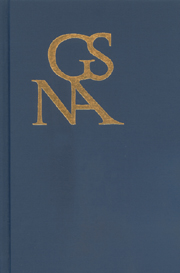Book contents
- Frontmatter
- Contents
- Special Section on Goethe and Idealism
- Introduction—Goethe and Idealism: Points of Intersection
- Goethe and Spinoza: A Reconsideration
- Goethean Intuitions
- Goethe's Notion of an Intuitive Power of Judgment
- “Idealism is nothing but genuine empiricism”: Novalis, Goethe, and the Ideal of Romantic Science
- The Quest for the Seeds of Eternal Growth: Goethe and Humboldt's Presentation of Nature
- Hegel's Faust
- Goethe contra Hegel: The Question of the End of Art
- Goethean Morphology, Hegelian Science: Affinities and Transformations
- Die Gretchenfrage: Goethe and Philosophies of Religion around 1800
- Civic Attachments & Sibling Attractions: The Shadows of Fraternity
- Margarete-Ariadne: Faust's Labyrinth
- Save the Prinz: Schiller's Geisterseher and the Lure of Entertainment
- Walsers Trilogie der Leidenschaft: Eine Analyse seines Goethe-Romans Ein liebender Mann im Kontext der Tradition der Ulrike-Romane
- Review Essay: What's New in the New Economic Criticism
- Book Reviews
Margarete-Ariadne: Faust's Labyrinth
from Special Section on Goethe and Idealism
Published online by Cambridge University Press: 05 February 2013
- Frontmatter
- Contents
- Special Section on Goethe and Idealism
- Introduction—Goethe and Idealism: Points of Intersection
- Goethe and Spinoza: A Reconsideration
- Goethean Intuitions
- Goethe's Notion of an Intuitive Power of Judgment
- “Idealism is nothing but genuine empiricism”: Novalis, Goethe, and the Ideal of Romantic Science
- The Quest for the Seeds of Eternal Growth: Goethe and Humboldt's Presentation of Nature
- Hegel's Faust
- Goethe contra Hegel: The Question of the End of Art
- Goethean Morphology, Hegelian Science: Affinities and Transformations
- Die Gretchenfrage: Goethe and Philosophies of Religion around 1800
- Civic Attachments & Sibling Attractions: The Shadows of Fraternity
- Margarete-Ariadne: Faust's Labyrinth
- Save the Prinz: Schiller's Geisterseher and the Lure of Entertainment
- Walsers Trilogie der Leidenschaft: Eine Analyse seines Goethe-Romans Ein liebender Mann im Kontext der Tradition der Ulrike-Romane
- Review Essay: What's New in the New Economic Criticism
- Book Reviews
Summary
READERS HAVE BEEN JUSTIFIABLY PUZZLED and disturbed by the violent, churlish response of Valentin upon learning of Margarete's relationship with Faust. Valentin's public condemnation of his sister forces readers to ask how patriarchy in this instance measures up against the feminine. The excessive, self-indulgent, and self-pitying behavior displayed by Valentin is better understood, I argue, when we consider the stature of Margarete herself, as opposed to seeing her as “his sister.” Valentin's inclusion in the tragedy of Margarete is in no way gratuitous or merely technically expedient. The reason frequently cited for Valentin's appearance and quick death is that Goethe needed a mechanism to extricate Faust from the all-too-alluring Gretchen tragedy and its strong gravitational pull; Faust needs to get on with the business of being Faust, it is argued, and by killing Valentin, he is forced to flee the city in the company of Mephistopheles. This reasonable explanation is made all the more plausible when we consider how Margarete carries most of the dramatic interest in Faust I, providing strong motivation for Goethe to close out her agency and liberate Faust for bigger deeds.
My reading of Margarete elevates her to universal womanhood as an Ariadne figure and encourages a reading of Faust that resembles what Penelope Reed Doob refers to as “labyrinthine literature.”
- Type
- Chapter
- Information
- Goethe Yearbook 18 , pp. 223 - 244Publisher: Boydell & BrewerPrint publication year: 2011

